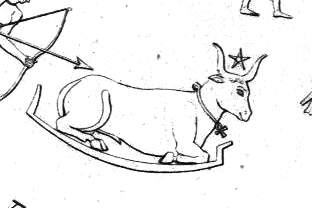Difference between revisions of "Template:Occult.live:Today's featured article"
Occultwiki (talk | contribs) |
Occultwiki (talk | contribs) |
||
| Line 1: | Line 1: | ||
[[File: | [[File:Hathor Dendera-B.jpg|200px|left]] | ||
'''[[ | '''[[Hathor]]''' was a major goddess in ancient [[Egyptian religion]] who played a wide variety of roles. As a sky deity, she was the mother or consort of the sky god [[Horus]] and the sun god [[Ra]], both of whom were connected with kingship, and thus she was the symbolic mother of their earthly representatives, the pharaohs. | ||
She was one of several goddesses who acted as the Eye of Ra, Ra's feminine counterpart, and in this form she had a vengeful aspect that protected him from his enemies. Her beneficent side represented music, dance, joy, love, sexuality, and maternal care, and she acted as the consort of several male deities and the mother of their sons. These two aspects of the goddess exemplified the Egyptian conception of femininity. Hathor crossed boundaries between worlds, helping deceased souls in the transition to the afterlife. | |||
'''([[ | Hathor was praised for her beautiful hair. Egyptian literature contains allusions to a myth not clearly described in any surviving texts, in which Hathor lost a lock of hair that represented her sexual allure. One text compares this loss with Horus's loss of his divine Eye and [[Set]]'s loss of his testicles during the struggle between the two gods, implying that the loss of Hathor's lock was as catastrophic for her as the maiming of Horus and Set was for them. | ||
'''([[Hathor|Full Article...]])''' | |||
Revision as of 16:38, 18 April 2025
Hathor was a major goddess in ancient Egyptian religion who played a wide variety of roles. As a sky deity, she was the mother or consort of the sky god Horus and the sun god Ra, both of whom were connected with kingship, and thus she was the symbolic mother of their earthly representatives, the pharaohs.
She was one of several goddesses who acted as the Eye of Ra, Ra's feminine counterpart, and in this form she had a vengeful aspect that protected him from his enemies. Her beneficent side represented music, dance, joy, love, sexuality, and maternal care, and she acted as the consort of several male deities and the mother of their sons. These two aspects of the goddess exemplified the Egyptian conception of femininity. Hathor crossed boundaries between worlds, helping deceased souls in the transition to the afterlife.
Hathor was praised for her beautiful hair. Egyptian literature contains allusions to a myth not clearly described in any surviving texts, in which Hathor lost a lock of hair that represented her sexual allure. One text compares this loss with Horus's loss of his divine Eye and Set's loss of his testicles during the struggle between the two gods, implying that the loss of Hathor's lock was as catastrophic for her as the maiming of Horus and Set was for them.
